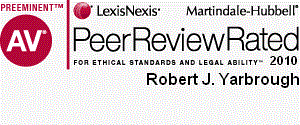Newsletter Issue 29 - July 2011
In this issue:
Treb Lipton
Inventions by employees - the Supreme Court changes the rules
Theft by a departing employee
Protecting intellectual property on Facebook
Robert Lipton, 1942-2011
 Our founding partner, Robert "Treb" Lipton died this month. Of
course, for our firm, and for his family, he had departed some time
ago in one of the cruelest jokes that disease plays on us: the
Alzheimer's Disease that robbed him of his memories. We will miss
him, but we have missed him for some time now. Only now, the
ceremonies of his passing have allowed us to celebrate his life.
Our founding partner, Robert "Treb" Lipton died this month. Of
course, for our firm, and for his family, he had departed some time
ago in one of the cruelest jokes that disease plays on us: the
Alzheimer's Disease that robbed him of his memories. We will miss
him, but we have missed him for some time now. Only now, the
ceremonies of his passing have allowed us to celebrate his life.
For his partners, his employees, and his colleagues, Treb was, as
they say, a force of nature. His was an oversized presence in any
room. His joy in flying, in learning about his clients' inventions,
the more than occasional off-color joke, and in his family were
evident in his characteristic crooked smile and crushing handshake.
The universal respect of other attorneys, judges, patent examiners,
clients and adversaries is a testament to his knowledge and skill.
Above all, his prudent business judgment meant that all who turned
to him received respectful and valuable counsel. Treb and I used to
say that attorneys have clients and retail businesses have customers
- the difference between the two is that while the customer is
always right, a client needs his lawyer to advise him when he is
wrong. Treb's clients understood and valued such advice.
For myself and the present and former members of Lipton, Weinberger
& Husick - we extend our condolences to Treb's family, and to all
those who knew our partner. His skill, knowledge and integrity will
continue to guide the manner in which we practice law - with
professionalism, respect, courtesy, and more than a bit of humor.
Lawrence Husick
Employees, Patent Rights and Government Contracts - Who owns that invention?

Every employer that engages in research and development work should
obtain a present assignment of patent rights in future inventions
from every employee. The U.S. Supreme Court underscored this fact in
the recent case of
Stanford v Roche.
Stanford University's research employee worked on a project to
detect HIV infection. In the employment agreement, the employee
"agree[d] to assign" to Stanford all inventions resulting from his
employment.
Stanford arranged for the employee to perform work on the HIV
project at Cetus, a small research company that had specialized DNA
amplification capabilities. As a condition of having access to the
Cetus facilities to perform the Stanford work, the employee signed
an agreement with Cetus saying that the employee "does hereby
assign" to Cetus his inventions made as a result of his access to
the Cetus facilities.
Get the picture? The Stanford agreement was an agreement to assign
in the future. The Cetus agreement was a present assignment of
rights to future inventions.
Stanford applied for and obtained patents on the HIV testing
procedure. Meanwhile, Roche acquired Cetus and commercialized the
HIV test in the form of test kits, which are now widely used.
Stanford sued Roche for patent infringement and the lawsuit made it
all the way to the Supreme Court. The Court's
decision is profoundly important for employers.
The bottom line: An employee inventor is free to assign an invention
made for an employer to someone else unless the invention is already
assigned to the employer, even if the research was funded by the
Federal government. An obligation of the employee to assign
inventions to the employer in the future is not good enough to
preserve the employer's rights in the invention.
Why it's important: Your employee can assign your invention to
anyone, including your competitor, unless you already have an
assignment from the employee.
If you are an employer, be sure to obtain a present assignment of
future inventions from every employee. If you are contracting for
development of an invention or product, obtain a present assignment
of future inventions preferably from both the development partner
and each person working on the project. You'll be glad you did.
Robert Yarbrough
Ask Dr. Copyright
Dear Doc:
We have a small business, and recently, one of our key employees
quit unexpectedly. Of course, we quickly secured things, but a
customer just called to say that she has been contacted by the
fellow, and that his company's brochure is quite similar to ours,
offering the same services and products. We did not have a
non-compete agreement, but we'd still like to know if there is
something that we can do to prevent his new employer from trying to
take all of our customers.
Sincerely,
Anxious Owner
Dear Angst (may I call you that?):
It sounds like your former employee may have done some very common,
but nevertheless, actionable things when he left your company.
Without a non-compete agreement that is reasonable in scope and
duration, the law usually will not prevent competition between you
and your former employee, but your competitors are not allowed to
profit from your intellectual property in competing with you. For
that reason, you may want to carefully examine this "new" brochure,
because it may infringe your copyrights (you did follow the Doc's
previous advice, and register your copyrights when you created the
brochure, right? If not, let's talk - soon!) If your dearly departed
worker is contacting a lot of your customers, he may have copied
your customer list, which may be protected both as a copyright and
as a trade secret. It's also common for employees to copy massive
amounts of data from your computers before leaving - forms,
specifications, bid documents, supplier lists, marketing materials -
and these copies may not be authorized or legal.
Enforcing your rights is something best done very quickly. Often,
filing an action for an injunction that seeks to prevent the former
employee and his new employer from copying or using the materials
that he took from your business may be done in Federal court, and
the decision may come in a matter of hours or days. The court may
also order discovery so that the former employee's computer and
files may be searched to find out what was taken.
We know that litigation is usually viewed as a last resort, but in
cases where you've invested a lot in developing marketing materials
and a good customer list, it may be quick action in court that
preserves that investment for your company, rather than handing it
to a competitor for free.
As always, ask the attorneys at LW&H - they do this stuff regularly.
Lawrence Husick
LWH Tests Facebook's Intellectual Property Protection Program
 Back in June 2009, we wrote about protecting trademarks under
Facebook's new URL redesign, which permitted a member to use a
personal name as part of his or her Facebook address. Aware that the
redesign offered new opportunities for trademark infringement,
Facebook simultaneously issued guidelines for protecting trademark
rights should a Facebook owner steal a mark by using it in his or
her Facebook address. It is important to note now that Facebook's
policies extend beyond the protection of intellectual property
misuse in Facebook addresses. Indeed, Facebook writes that it is, in
the general sense, "committed to protecting the intellectual
property of third parties" and publishes guidelines and provides
opportunities for intellectual property owners to protect their
rights in the vast Facebook community. The focus of Facebook's
polices is copyright protection, which is to be expected; but the
rules also provide protection for other kinds of intellectual
property, including trademarks. But how effective are these
policies? Well, we recently had the opportunity to test them.
Back in June 2009, we wrote about protecting trademarks under
Facebook's new URL redesign, which permitted a member to use a
personal name as part of his or her Facebook address. Aware that the
redesign offered new opportunities for trademark infringement,
Facebook simultaneously issued guidelines for protecting trademark
rights should a Facebook owner steal a mark by using it in his or
her Facebook address. It is important to note now that Facebook's
policies extend beyond the protection of intellectual property
misuse in Facebook addresses. Indeed, Facebook writes that it is, in
the general sense, "committed to protecting the intellectual
property of third parties" and publishes guidelines and provides
opportunities for intellectual property owners to protect their
rights in the vast Facebook community. The focus of Facebook's
polices is copyright protection, which is to be expected; but the
rules also provide protection for other kinds of intellectual
property, including trademarks. But how effective are these
policies? Well, we recently had the opportunity to test them.
One of our clients owns a chain (soon to be a national franchise) of
ice-cream restaurants under a catchy name (sorry, we have to protect
our client's identity) for which it has a United States trademark
registration. The name is so catchy, that it is currently involved
in several trademark infringement disputes in different parts of the
country. (Remember, a trademark owner has a duty to enforce its
trademark rights.) The infringers tend to be small local ice-cream
establishments whose only presence on the Internet is on Facebook.
In addition to sending the infringers cease-and-desist letters and
in one case filing suit against it in federal court, our client
requested us to try to take down their Facebook web pages in which
they freely infringe its mark. To accomplish this, we visited
Facebook and followed its guidelines for filing a complaint. Within
24 hours we received a message from the Facebook User Operations
Department asking us for further details about our client's
trademark rights. In response, we submitted to Facebook an
explanation of how the infringer's Facebook pages created confusion
in the marketplace, a copy of our client's trademark registration
certificate, and a copy of the complaint filed against one of the
infringers in federal court. Within 24 more hours, we were notified
by Facebook that the infringing content was removed. We checked and,
sure enough, the offending Facebook pages were no longer online.
The efficiency and speed of the Facebook intellectual property
procedures were impressive. Keep this in mind if your intellectual
property rights are being infringed by a Facebook member and you can
demonstrate to Facebook that you own those rights. Let us know if we
can help.
Adam Garson

